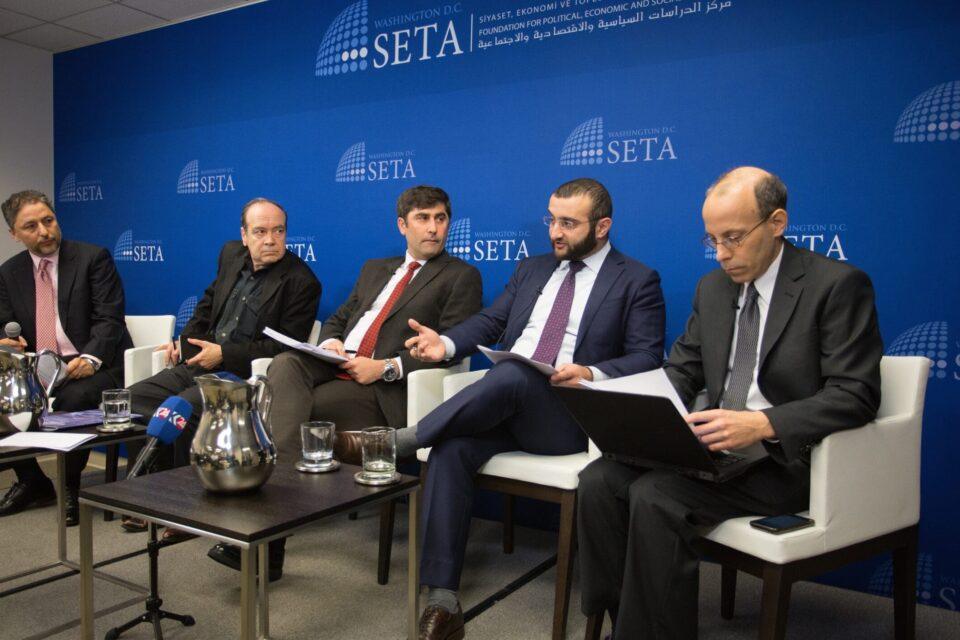SETA D.C. Hosts Panel on The U.S.-Russia-Turkey Triangle on Syria

On March 31, 2017, the SETA Foundation at Washington D.C. hosted a panel discussion entitled, “The U.S.-Russia-Turkey Triangle on Syria.” The discussion focused on the strategic objectives of the U.S., Russia, and Turkey and their points of contention and cooperation with one another. Other items discussed during the event included the possibility of creating safe-zones in the northern Syria, combating extremist forces, and brokering a peaceful diplomatic solution to the Syrian crisis. Panelists included Richard Weitz, director of the Center for Political-Military Analysis at the Hudson Institute; Faysal Itani, a senior fellow with the Atlantic Council’s Rafik Hariri Center for the Middle East; Murat Yesiltas, director of security studies at the SETA Foundation; and Mark Perry, an independent author specialized in military analysis. The panel was moderated by Kadir Ustun of the SETA Foundation at Washington D.C.
Faysal Itani has been looking at Syria from both a regional and international lens. He explained the constraints on each nation as they operate in Syria. Turkey’s constraints include domestic politics, the sensitive topic of military casualties, the obstacle of being ‘stuck’ in an alliance with the U.S. through NATO, and Russia’s military escalation in the region. Itani pointed out that Russia’s most recognized constraint is the financial constraint it faces in funding its operations. And while there is a question about how much Russia can afford and how much pain they’re willing to take, Itani believes it is a lot more than people think. Time is also a constraint on Russia because the longer it takes to achieve a political military solution, the worse off, and weaker, Russia looks. U.S. constraints, according to Itani, include a shortage of suitable partners. The PYD has emerged as the most suitable partner for the U.S. in its opinion. The U.S. must also determine how to accommodate Russian interests and whether or not it is even worth doing so.
Murat Yesiltas pointed out that there is a lot of ambiguity regarding the Syrian crisis. Yesiltas explained that Russia has escalation dominance and has used the YPG as a counter escalation tool against Turkey. He noted that Russia is trying to use YPG forces to disrupt Turkey’s potential strategic plan. Turkey knows that in northern Syria, and the Middle East in general, the wait and see approach does not work. It is therefore important to understand Turkish strategic options: military (direct military intervention and indirect military intervention) and political (based off of Turkey’s domestic political situation and negotiations with the U.S. and other regional actors to prevent PKK take over in the region).
Mark Perry discussed the important role the budget plays in U.S. military strategy. He pointed out that there is natural contention between those who recruit, equip, and train the military and those who use the military. Those who recruit, equip, and train argue for more readiness, while those who utilize the military ask for more money for combat operations. Perry said he believes that this disagreement is driving the Trump administration’s ISIS strategy and Middle East posture. He contended that the Trump administration has a defensible strategy in the Middle East, even if it seems chaotic and uncertain at times. Perry also explained that the war has been turned over to the generals and targeting is no longer happening in the White House, as it did during the Clinton, Bush, and Obama years.
Richard Weitz wanted to take a step back to look at the triangle in turns of three and to look at the relations between each actor. He began by saying that from all appearances, it seems that Secretary of State Rex Tillerson’s visit to Ankara did not resolve any issues dominating the relationship, which was also evident by criticisms made by Turkish officials. Meanwhile, Russia and Turkey have common issues and concerns around the region and Russian analysts see Turkey as a rising power along with India. There is also new flexibility of the Turkish approach to foreign policy that is not wedded to NATO, or the U.S., and is therefore increasingly influenced by Russia. Both nations also have a sense of being alienated by Europe even though they see themselves as European. Points of contention between the two countries may may include Turkey importing Russian energy, but not offering any high tech goods in return. Weitz further explained that Russia has not reversed its openness to having a role in Central Asia and cautioned that China’s large economic influence means that the effect of Turkish actions in the region will be marginal.





















